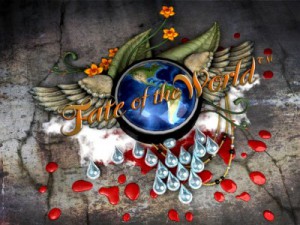 Insofar as a game can be about something The Fate of the World is about ruling the world to eliminate global warming. The problem with games being about something is the general incompatibility between the real world and video games. Lets knock up a short list of stuff that’s important to video games:
Insofar as a game can be about something The Fate of the World is about ruling the world to eliminate global warming. The problem with games being about something is the general incompatibility between the real world and video games. Lets knock up a short list of stuff that’s important to video games:
- A clear goal (go right and rescue the princess)
- A clear set of options (run back and forth, jump)
- Predictable results from the chosen options (what goes up, must come down)
- The ability to try the same challenge or a similar challenge over and over allowing you to learn.
Note that none of these are really present in world governance. Fate of the World is largely the same way. It simulates pretty well the hopeless “I have no idea what’s going on but I guess I choose… more taxes?” decision making process of government. The problem with stripping away all the things in the list is that it leaves you with an environment that is not conducive to learning. Video games are about learning so Fate of the World is not a great video game. Which is too bad. You’d think you were in for a fun afternoon with a “take control of the world and save it from climate change and petty nationalistic bickering by whatever means you can” game.
But the problems are all listed on that list up there. You probably haven’t played the game and there’s no demo so I’ll have to do some work explaining it to you.
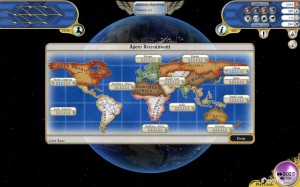 There is a world made up of 12 regions. You play cards in each region to set policy which then changes the region, your selection of cards, and the world.
There is a world made up of 12 regions. You play cards in each region to set policy which then changes the region, your selection of cards, and the world.
So far so good. This also describes (minus the weird playingcards metaphor) great games like SimCity, Cliffski’s games Kudos and Democracy, and Sarah’s game Rebuild.
You start out playing all of these games the same. You start playing the metaphor (People are being killed by zombies? I should find more soldiers I guess) and as you progress you start playing the rules of the game instead (well I need 6 soldiers and I know that on average 2 zombies a turn show up at the walls so I have 3 turns to find more soldiers). You get better at the game by reverse engineering it. That’s why they’re fun because you are learning the rules behind the metaphor and thus get better at the game.
To be able to do this you need a couple to things from the game. They are listed up there at the top. Unfortunately Fate of the World has some serious problems on the predictability side of things.
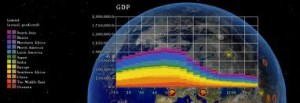 Lets take an example. There is a card called “Commit to Renewables”. It “influences” a region towards renewable energy. When I play the card it will make graphs move around. Graphs like the one on the right. There are a lot of graphs because there are a lot of underlying systems. The basics of “Commit to Renewables” are pretty simple. It makes the things in the “Renewables” graph like solar and tidal energy go up. But in every country they go up by different amounts. Do I just have to memorise the differences between countries? Should I be scouring the web for material on South African geothermal output? What’s worse is I that can’t figure out how this graph interacts with the many other graphs. Renewables feed into the harmful emissions system and I’m pretty sure I know how that interaction works. They are, however, not independent of the other energy systems so they also feeds into the regional coal, oil, gas and nuclear systems. Those systems each feed into international versions of those systems which in turn flow back into residential, commercial, and industrial systems as well as the happiness system for your region. That system feeds into the happiness system of the world which feeds back into the residential, commercial and industrial systems, as well as the regional outlook, contentment, militancy, and stability systems. Which feed into yet more systems like war and poverty. I have played for two days and am still identifying systems that I didn’t even know existed.
Lets take an example. There is a card called “Commit to Renewables”. It “influences” a region towards renewable energy. When I play the card it will make graphs move around. Graphs like the one on the right. There are a lot of graphs because there are a lot of underlying systems. The basics of “Commit to Renewables” are pretty simple. It makes the things in the “Renewables” graph like solar and tidal energy go up. But in every country they go up by different amounts. Do I just have to memorise the differences between countries? Should I be scouring the web for material on South African geothermal output? What’s worse is I that can’t figure out how this graph interacts with the many other graphs. Renewables feed into the harmful emissions system and I’m pretty sure I know how that interaction works. They are, however, not independent of the other energy systems so they also feeds into the regional coal, oil, gas and nuclear systems. Those systems each feed into international versions of those systems which in turn flow back into residential, commercial, and industrial systems as well as the happiness system for your region. That system feeds into the happiness system of the world which feeds back into the residential, commercial and industrial systems, as well as the regional outlook, contentment, militancy, and stability systems. Which feed into yet more systems like war and poverty. I have played for two days and am still identifying systems that I didn’t even know existed.
So we’re in real kill-all-the-butterflies territory here. This throws out the whole “comprehensible actions that lead to comprehensible consequences” portion of our list.
Even this could potentially be made to work if they got the last bullet point right: “The ability to try the same challenge or a similar challenge over and over allowing you to learn”. And they actually got closer on this one than the previous two. There is only one scenario to play (until you beat it, unlocking the next one). This scenario can not be beaten creatively, or in a myriad of ways. There are a narrow few solutions to each level. This makes The Fate of the World a traditional puzzle game instead of an open Civilizationy strategy game. Your goal is to find the right path through the disastrous future. The one shining road of hope. This is what makes the game somewhat playable. This Groundhog Day like approach to saving the world.
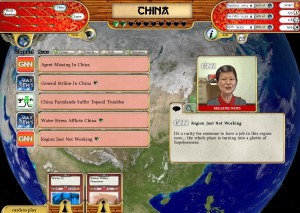 Unfortunately there is a magic game design number they are breaking. I don’t know what the value of this number is but I know its units. It is (time invested)*(percent chance of failure). It is the price of failure. And it is too god damned high. I am willing to invest an hour to replay the same level as long as each play through provides big insights “oh, people who are unhappy go to war”. If I get enough insights per minute then It’s worth playing through again. As I figure out the big systems, however, I’m getting fewer and fewer insights per minute because the little interactions are harder and harder to untangle. That’s why most games are about learning just a few systems and mabey layering in more systems over time. It keeps us learning at a reasonable rate.
Unfortunately there is a magic game design number they are breaking. I don’t know what the value of this number is but I know its units. It is (time invested)*(percent chance of failure). It is the price of failure. And it is too god damned high. I am willing to invest an hour to replay the same level as long as each play through provides big insights “oh, people who are unhappy go to war”. If I get enough insights per minute then It’s worth playing through again. As I figure out the big systems, however, I’m getting fewer and fewer insights per minute because the little interactions are harder and harder to untangle. That’s why most games are about learning just a few systems and mabey layering in more systems over time. It keeps us learning at a reasonable rate.
They could have fixed this game by ripping out three quarters of the systems and focusing on the few that express the soul of the problem. Or they could have given us tiny little problems to solve in this labyrinth of rules (probably not as fun). As it is I find the game frustrating and opaque although if you’re looking for a massive knot to untangle while blindfolded you couldn’t do better.
One last note. Bizarrely, this game is based on a previous flash game by the same developers that has the opposite problems! It lays all the rules out at your feet leaving you nothing to learn. Try it out here. Don’t assume it captures the feel of Fate of the World, it is in many ways it’s shadowy opposite.

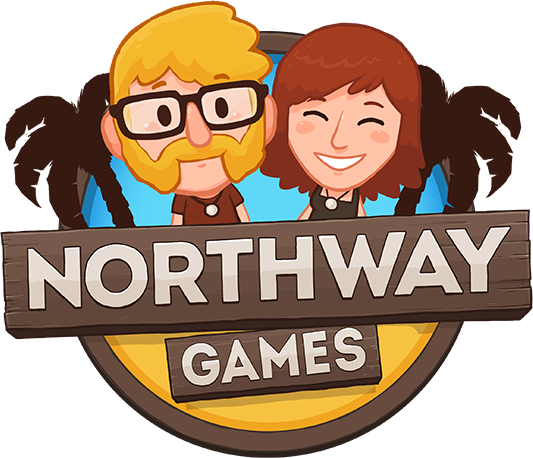
Comments
23 responses to “The Fate of The Fate of the World”
I finally beat Fate of the World after weeks of trying! :D I took an eco-fanatic approach, making everyone except the us & middle east organic vegan monkey-huggers who rejoiced every time I global banned another resource. Global warming still turned all the arable land into desert, but I skated by to 2200 at exactly 3 degrees with 3 billion (starving, jobless) people still alive. Success..?
how to get quality backlinks 2011
ztayudtql vmhhb gutsmwd fxxg sfbgkxtpysgtsoj
… [Trackback]
[…] Information on that Topic: northwaygames.com/the-fate-of-the-fate-of-the-world/ […]
… [Trackback]
[…] Find More Information here on that Topic: northwaygames.com/the-fate-of-the-fate-of-the-world/ […]
… [Trackback]
[…] Here you can find 65132 more Information on that Topic: northwaygames.com/the-fate-of-the-fate-of-the-world/ […]
… [Trackback]
[…] Read More Info here to that Topic: northwaygames.com/the-fate-of-the-fate-of-the-world/ […]
… [Trackback]
[…] Find More Information here to that Topic: northwaygames.com/the-fate-of-the-fate-of-the-world/ […]
… [Trackback]
[…] Here you can find 84170 additional Info to that Topic: northwaygames.com/the-fate-of-the-fate-of-the-world/ […]
… [Trackback]
[…] Read More Info here on that Topic: northwaygames.com/the-fate-of-the-fate-of-the-world/ […]
… [Trackback]
[…] Information to that Topic: northwaygames.com/the-fate-of-the-fate-of-the-world/ […]
… [Trackback]
[…] Info to that Topic: northwaygames.com/the-fate-of-the-fate-of-the-world/ […]
… [Trackback]
[…] Find More here on that Topic: northwaygames.com/the-fate-of-the-fate-of-the-world/ […]
… [Trackback]
[…] Find More to that Topic: northwaygames.com/the-fate-of-the-fate-of-the-world/ […]
… [Trackback]
[…] There you can find 74298 additional Info on that Topic: northwaygames.com/the-fate-of-the-fate-of-the-world/ […]
… [Trackback]
[…] Information on that Topic: northwaygames.com/the-fate-of-the-fate-of-the-world/ […]
… [Trackback]
[…] Here you will find 44398 more Information to that Topic: northwaygames.com/the-fate-of-the-fate-of-the-world/ […]
… [Trackback]
[…] Find More to that Topic: northwaygames.com/the-fate-of-the-fate-of-the-world/ […]
… [Trackback]
[…] Find More here on that Topic: northwaygames.com/the-fate-of-the-fate-of-the-world/ […]
… [Trackback]
[…] Read More here to that Topic: northwaygames.com/the-fate-of-the-fate-of-the-world/ […]
… [Trackback]
[…] Information to that Topic: northwaygames.com/the-fate-of-the-fate-of-the-world/ […]
… [Trackback]
[…] Information on that Topic: northwaygames.com/the-fate-of-the-fate-of-the-world/ […]
… [Trackback]
[…] Info on that Topic: northwaygames.com/the-fate-of-the-fate-of-the-world/ […]
… [Trackback]
[…] Read More to that Topic: northwaygames.com/the-fate-of-the-fate-of-the-world/ […]